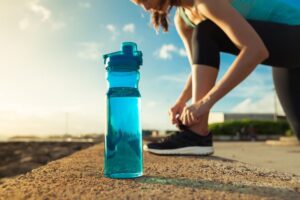HYDRATION AND INJURY RISK
Water plays a huge roll in all cellular activities, transporting essential vitamins and minerals at the cell level throughout the body. If your body becomes dehydrated, the capability of your transport system is compromised and you will lack strength and energy.
Hydration during exercise is essential, a fully hydrated body is 50-65% water (the rest is muscle, bone, organs and fat). Losing just 1% of your body’s water content to sweat when you work out can put you at risk for injury and illness, particularly in hot or humid weather.
Benefits of hydration
Health benefits of proper hydration include:
- Water helps remove toxins that lead to inflammation
- Water increases the immune system and helps prevent movement system disorders
- Water increases the lubrication of joints and can help to prevent arthritis and back pain
- Water regulates body temperature
- Water gives your muscles an energy boost
- Water helps to prevent heart disease and stroke by helping to prevent blockage of arteries
- Water enhances brain function and helps prevent memory loss
- Water improves skin health and mucous membranes

How much water does our body need?
According to the NHS and Eatwell Guide, we should be drinking 6-8 cups of water per day. If you do not like plain water then try adding a slice of lemon or lime to it, or perhaps try sparkling water.
How can dehydration affect the body?
How will you know if you’re dehydrated? The first symptom will usually be that you feel thirsty! Other symptoms may include: dryness of the lips, mouth and tongue; reduced energy; decreased or infrequent urination; a sudden decline in mood, strength, or the ability to make decisions.
Dehydration can also affect the musculoskeletal system (muscles and joints) in the following ways:
- Cramps – your body needs both water and electrolytes to support normal muscle contractions. When you sweat heavily during workouts, you lose both, causing cramp.
- Cartilage wear – water and electrolytes are essential in delivering nutrients that help cartilage repair itself when injured.
- Friction in the joints – cartilage is made of collagen, proteins, cells, synovial fluid, and water (up to 80% water). This cushions the bones when they bear weight or pressure. Dehydration can deprive the cartilage of the water it needs to maintain this cushion, which can lead to achy or creaking joints, and sometimes Osteoarthritis.
